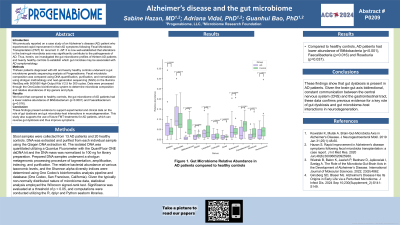Sunday Poster Session
Category: Colon
P0209 - Alzheimer’s Disease and the Gut Microbiome
Sunday, October 27, 2024
3:30 PM - 7:00 PM ET
Location: Exhibit Hall E

Has Audio
- AV
Adriana Vidal, PhD
ProgenaBiome
Ventura, CA
Presenting Author(s)
Adriana Vidal, PhD, Brad Barrows, MD, Guanhui Bao, PhD, Andreas Papoutsis, PhD, Sabine Hazan, MD
ProgenaBiome, Ventura, CA
Introduction: We previously reported on a case study of an Alzheimer’s disease (AD) patient who experienced rapid improvement in their AD symptoms following Fecal Microbiota Transplantation (FMT) for recurrent C. diff. It is now well-established that alterations in the brain-gut-microbiota axis may significantly contribute to the pathogenesis of AD. Thus, herein, we investigated the gut microbiome profiles of thirteen AD patients and twenty healthy controls to establish which gut microbes may be associated with AD symptomatology.
Methods: Thirteen patients diagnosed with AD and twenty healthy controls underwent a gut microbiome genetic sequencing analysis at Progenabiome. Fecal microbiota composition was compared using DNA quantification, purification, and normalization using shotgun methodology and next-generation sequencing (NGS) on the Illumina NextSeq with 500/550 High-Output Kits V.2.5 for 300 cycles. Data were processed through the OneCodex bioinformatics system to determine microbiota composition and relative abundances of top genera and phyla.
Results: We found that compared to healthy controls, the gut microbiome of AD patients had a lower relative abundance of Bifidobacterium (p< 0.0001) and Faecalibacterium (p=0.016). At the Species level, AD patients had lower microbiome diversity, as measured by the Shannon Index, (p=0.02), compared to controls.
Discussion: These findings present evidence to support experimental and clinical data on the role of gut dysbiosis and gut microbiota-host interactions in neurodegeneration. This study also supports the use of future FMT treatments for AD patients, which can reverse gut dysbiosis and thus improve symptoms.
Disclosures:
Adriana Vidal, PhD, Brad Barrows, MD, Guanhui Bao, PhD, Andreas Papoutsis, PhD, Sabine Hazan, MD. P0209 - Alzheimer’s Disease and the Gut Microbiome, ACG 2024 Annual Scientific Meeting Abstracts. Philadelphia, PA: American College of Gastroenterology.
ProgenaBiome, Ventura, CA
Introduction: We previously reported on a case study of an Alzheimer’s disease (AD) patient who experienced rapid improvement in their AD symptoms following Fecal Microbiota Transplantation (FMT) for recurrent C. diff. It is now well-established that alterations in the brain-gut-microbiota axis may significantly contribute to the pathogenesis of AD. Thus, herein, we investigated the gut microbiome profiles of thirteen AD patients and twenty healthy controls to establish which gut microbes may be associated with AD symptomatology.
Methods: Thirteen patients diagnosed with AD and twenty healthy controls underwent a gut microbiome genetic sequencing analysis at Progenabiome. Fecal microbiota composition was compared using DNA quantification, purification, and normalization using shotgun methodology and next-generation sequencing (NGS) on the Illumina NextSeq with 500/550 High-Output Kits V.2.5 for 300 cycles. Data were processed through the OneCodex bioinformatics system to determine microbiota composition and relative abundances of top genera and phyla.
Results: We found that compared to healthy controls, the gut microbiome of AD patients had a lower relative abundance of Bifidobacterium (p< 0.0001) and Faecalibacterium (p=0.016). At the Species level, AD patients had lower microbiome diversity, as measured by the Shannon Index, (p=0.02), compared to controls.
Discussion: These findings present evidence to support experimental and clinical data on the role of gut dysbiosis and gut microbiota-host interactions in neurodegeneration. This study also supports the use of future FMT treatments for AD patients, which can reverse gut dysbiosis and thus improve symptoms.
Disclosures:
Adriana Vidal: Progenabiome – Employee. Progenabiome – Employee.
Brad Barrows: Progenabiome – Medical Director at Progenabiome. Progenabiome – Medical Director at Progenabiome.
Guanhui Bao: Progenabiome – Consultant. Progenabiome – Consultant.
Andreas Papoutsis: Progenabiome – Consultant.
Sabine Hazan: Microbiome Resarch Foundation – Owner/Ownership Interest. Microbiome Research Foundation – Owner/Ownership Interest.
Adriana Vidal, PhD, Brad Barrows, MD, Guanhui Bao, PhD, Andreas Papoutsis, PhD, Sabine Hazan, MD. P0209 - Alzheimer’s Disease and the Gut Microbiome, ACG 2024 Annual Scientific Meeting Abstracts. Philadelphia, PA: American College of Gastroenterology.
